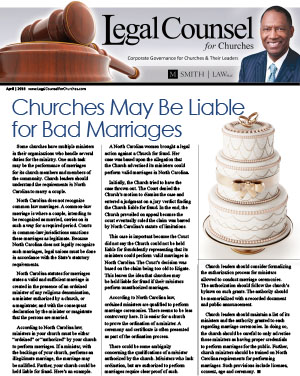I often advise church organizations on how to improve their corporate governance. Corporate governance is the process organizations employ to ensure efficient policy and strategic making. The reason I recommend churches undertake proper governance is to help ensure they are good stewards of their resources.
A common misnomer is that governance is complicated and hard to install. This is not so at all. In fact, an effective system of governance makes church operations run smoother. This is because all leadership will have a common set of rules by which the church is to function. When questions about procedures and policy arise, the governance structure informs management on the appropriate course of action.
There is no one set of corporate governance policies that is right for every church. The autonomy, culture and belief systems of individual churches necessitate custom governance structures. However, there are some basic tips that all churches should consider to make their governance prudent and workable.
1 | Hold Regular Board Meetings
If your church is organized under the structure of an elected/appointed body, ensure this group meets regularly. Whether this group is called a board of directors, elders, trustees or deacons, the legal fiduciary duties are the same. The church board is held to the same standard as any Fortune 500 corporation board. Regular meetings with sensible discussions about the organization are expected activities under the law.
2 | Annual Independent Audit
The church should conduct an annual independent audit of its books. This is to ensure proper accounting and searches for ways to make process improvements. If the church does not hire an independent accounting firm, consider forming an internal audit committee. The internal committee should be separate from management and skilled in the auditing function.
3 | Ethics Training
Church leadership should undergo ethics training annually. A good ethics practice protects the church and its leadership from unintentional missteps. An annual review of the ethics training is important because the law is constantly evolving on this issue.
4 | Periodic Policy Reviews
Church policies should be evaluated every so often. The frequency of the reviews should be close enough to make sure the policies are current, suitable and reflects current activities.
5 | Conflicts Statements
Church leadership should be reminded each year of its rules on conflicts of interests. A conflict is not a bad word. At some point, most persons in leadership find themselves with a personal conflict of interest in a church matter. The key is how diligent the leader and the church act to isolate the conflict before a critical decision is made.
6 | Strategic Planning
Organizations engage in strategic planning to ensure their direction is planned and properly executed. a church have the same responsibility to shepherd its course. Church leadership should set aside time no less than annually to discuss its direction and plans for the future.
7 | Annual Budgets
A budget is a forecast for how the church plans to manage its income and expenses. This becomes a governance issue because leadership is ultimately responsible for church assets and operations. An annual budget helps focus the decision-makers on how the church plans to deploy resources.

